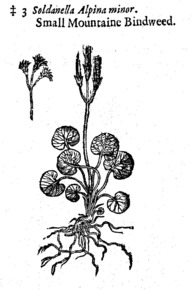
Gerard's Herbal - Part 3
|
|
|
| Fig. 1244. Sea Bindweed (1) |
Fig. 1245. Mountain Bindweed (2) |
The Description.
1. Soldanella or Sea Bindweed hath many small branches, somewhat red, trailing upon the ground, beset with small and round leaves, not much unlike Asarabacca, or the leaves of Aristolochia, but smaller; betwixt which leaves and the stalks come flowers formed like a bell, of a bright red incarnate colour, in every respect answering the small Bindweed, whereof it is a kind, albeit I have here placed the same, for the reasons rendered in my proem. The seed is black, and groweth in round husks: the root is long and small, thrusting itself far abroad, and into the earth like the other Bindweeds.
2. Soldanella or Mountain Bindweed hath many round leaves spread upon the ground, not much unlike the former, but rounder, and more full of veins, greener, of a bitter taste like Sea Bindweed: among which cometh forth a small and tender stalk a handful high, bearing at the top little flowers like the small Bell-flower, of a sky colour. The root is small and thready.

Fig. 1246. Small Mountain Bindweed (3)
3. There is of this kind another having all the parts smaller, and the leaves redder and rounder: the flowers also blue, and composed of one leaf divided into five parts, and succeeded by a longish cod, round and sharp pointed.
The Place.
The first grows plentifully by the sea-shore in most places of England, especially near to Lee in Essex, at Mersea in the same county, in most places of the Isle of Thanet, and Sheppey, and in many places along the Northern coast.
The second groweth upon the mountains of Gerrnany, and the Alps; it groweth upon the mountains of Wales, not far from Cowmers Mere in North Wales.
The Time.
These herbs do flower in June, and are gathered in August to be kept for medicine.
The Names.
The first called Soldanella is of the Apothecaries and the ancients called Marina Brassica, that is to say, Sea Colewort: but what reason hath moved them so to do I cannot conceive, unless it be penury and scarcity of names, and because they know not otherwise how to term it: of this I am sure, that this plant and Brassica are no more like than things which are most unlike; for Brassica marina is the Sea Colewort, which doth much resemble the garden Cabbage or Cole, both in shape and in nature, as I have in his due place expressd. A great fault and oversight therefore it hath been of the old writers and their successors which have continued the custom of this error, not taking the pains to distinguish a Bindweed from a Colewort. But to avoid controversies, the truth is, as I have before showed, that this Soldanella is a Bindweed and cannot be esteemed for a Brassica, that is a Colewort. The later Herbarists call it Soldana, and Soldanella: in Dutch, Zeewind, that is to say, Convoluulus marinus: of Dioscorides Brassica marina: in English, Sea Withwind, Sea Bindweed, Sea-Bells, Sea-Cole, of some, Sea Foalfoot, and Scottish Scurvy-Grass.
The second is called Soldanella montana: in English, Mountain Bindweed.
The Nature.
Sea Bindweed is hot and dry in the second degree: the second is bitter and very astringent.
The Virtues.
A. Soldanella purgeth down mightily all kind of waterish humours, and openeth the stoppings of the liver, and is given with great profit against the dropsy, but it must be boiled with the broth of some fat meat or flesh, and the broth drunk; or else the herb taken in powder worketh the like effect.
B. Soldanella hurteth the stomach, and troubleth the weak and delicate bodies which do receive it in powder, wherefore aduice must be taken to mix the said powder with Anise seeds, cinnamon, ginger, and sugar, which spices do correct his malignity.
C. Practitioners about Augsburg and Ravensburg (cities of Germany) do greatly boast that they have done wonders with this herb Soldanella montana; saying, that the leaves taken and emplastered upon the navel and somewhat lower, draw forth water from their bellies that are hydroptic, that is, troubled with water or the dropsy: this effect it worketh in other parts without heating.
D. It doth also wonderfully bring flesh in wounds, and healeth them.
E. Dioscorides witnesseth, that the whole herb is an enemy to the stomach, biting and extremely purging (both sodden and taken with meat) and bringeth troublesome gripings thereinto, and doth oftentimes more hurt than good.
F. My friend Mr. Goodyer hath told me, that in Hampshire at Chichester and thereabout they make use of this for Scurvy-Grass and that not without great error, as any that know the qualities may easily perceive.